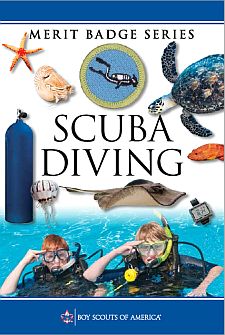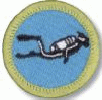All scuba instruction must be conducted by recreational diving instructors in good standing with a scuba agency recognized by the Boy Scouts of America and approved by the BSA local council.
Unlike many other merit badges, the Scuba Diving critical prerequisites, knowledge, and skills are not itemized in the requirements nor adequately covered in the merit badge pamphlet. The requirement to earn Open Water Diver Certification means the Scout must meet training requirements set by outside agencies and must supplement the material in the merit badge pamphlet with an entry-level scuba diver manual.
Note: Although it is not required, Scouts are encouraged to earn the Scuba BSA badge prior to working on the Scuba Diving merit badge.
NOTE: You must earn the Swimming Merit Badge prior to working on requirements 3-6.
Requirements:
- Do the following:
- Show that you know first aid for injuries or illnesses that could occur while scuba diving, including hypothermia, hyperventilation, squeezes, decompression illness, nitrogen narcosis, motion sickness, fatigue, overexertion, heat reactions, dehydration, injuries by aquatic life, and cuts and scrapes.
- Identify the conditions that must exist before performing CPR on a person, and explain how to recognize such conditions. Demonstrate the proper technique for performing CPR using a training device approved by your counselor.
- Before completing requirements 3 through 6, earn the Swimming merit badge.
- Discuss the Scuba Diver’s Code with your merit badge counselor, and explain the importance of each guideline to a scuba diver’s safety.
- Earn an Open Water Diver Certification from a scuba organization recognized by the Boy Scouts of America scuba policy.
- Explain what an ecosystem is, and describe four aquatic ecosystems a diver might experience.
- Find out about three career opportunities in the scuba industry. Pick one and find out the education, training, and experience required for this profession. Discuss this with your counselor, and explain why this profession might interest you.
Minimum Course Content for Open Water Diver Certification
The following abbreviated list represents the RSTC “Minimum Course Content for Open Water Diver Certification.” It is not intended as a complete outline of learning objectives for an Open Water Diver course. Development of learning objectives is left to the respective training agencies.
During the Open Water Diver course you can look forward to learning basic scuba theory and developing entry-level scuba skills required for certification. All scuba instruction must meet the minimum training standards for Entry-Level Scuba Certification set by the Recreational Scuba Training Council (RSTC). Your course will consist of the topics and scuba skills required by the training organization and as outlined in this section. At a minimum, the following will be covered.
- Equipment. Learn the physical description, operating principles, maintenance, and use of the following equipment items—face mask, fins, snorkel, BCD, exposure suit, weights and weight system, float and flag, cylinders, valves, regulators/air-delivery system, submersible pressure gauge, alternate air source, timing device, compass, depth gauge, dive table or dive computers, knife.
- Physics of Diving. Learn the physical principles of matter and their application to diving activities and hazards.
- Medical Problems Related to Diving. Learn the causes, symptoms, prevention, and first-aid and treatment of diving medical problems.
- Decompression Theory and Use of Dive Tables and/or Dive Computers. Learn how to determine no-decompression limits for single and repetitive dives, plus how to use dive tables and/or dive computers to properly plan and execute a dive.
- Dive Environment. Learn information on the local and general conditions of the diving environment and their possible effects on the diver.
- General Topics. Learn information on dive planning, underwater and surface communications, diver assistance, recommended diving practices (including safety stops), procedures for diving from boats, proper use of personal diving logbook, and local dive regulations and protocols.
- Pool/Confined Water Scuba Skills. Learn and practice
the following scuba skills in a pool or confined water.
- Diving system assembly and disassembly
- Equipment inspection (at water’s edge)
- Entries and exits
- Proper weighting
- Mouthpiece clearing—snorkel and regulator
- Regulator/snorkel exchanges at the surface
- Controlled descents and ascents
- Underwater swimming
- Mask-clearing, including removal and replacement
- Underwater exercises—with and without mask
- Buddy-system techniques
- Underwater and surface buoyancy control
- Underwater problem-solving (regulator recovery/retrieval, etc.)
- Surface-snorkel swimming with full diving system
- Surface operation of the quick release/emergency function of the weight system
- Underwater removal and replacement of scuba system
- Underwater removal and replacement of the weight/ballast system
- Out-of-air emergency alternatives, including at least one dependent procedure and one independent procedure
- Equipment care and maintenance (at water’s edge)
- Open Water Scuba Skills. Perform the following
scuba skills while diving in open water.
- Equipment inspection (at water’s edge)
- Entries and exits
- Proper Weighting
- Mouthpiece clearing—snorkel and regulator
- Regulator/snorkel exchanges at the surface
- Controlled descents and ascents
- Underwater swimming
- Mask-clearing
- Buddy-system techniques
- Underwater and surface buoyancy control
- Diver assistance techniques (self/buddy)
- Surface-snorkel swimming with full diving system
- Removal and replacement of weight/ballast system
- Removal and replacement of scuba system
- Out-of-air emergency alternatives
- Equipment care and maintenance (at water’s edge)
- Underwater navigation
Notes for Requirement 4:
Agencies recognized by the BSA for scuba training are
- PADI - Professional Association of Diving Instructors;
- NAUI - National Association of Underwater Instructors;
- SSI - Scuba Schools International;
- IDEA - International Diving Educators Association;
- PDIC - Professional Diving Instructors Corporation; and
- SDI - Scuba Diving International.
In addition to the agencies listed by name, any current member of the World Recreational Scuba Training Council (WRSTC) is also recognized.
Scuba industry standards for Open Water Diver Certification require the student to be at least 15 years of age. Students under the minimum age who meet open water scuba performance requirements may qualify for a special certification that allows them to dive with an adult buddy who has, as a minimum, an open water scuba certification. Several of the scuba organizations recognized by the BSA offer “junior” open water certifications for those as young as 10; others have a minimum age of 12. Such junior open water diver certifications satisfy Scuba Diving merit badge requirement 4.
Scouts who have already earned an Open Water Diver Certification outside of a BSA activity from a scuba agency recognized by the Boy Scouts of America scuba policy may still earn the Scuba Diving merit badge by earning the Swimming merit badge and completing all other listed requirements.
Note to the Merit Badge Counselor:
In the 2021 Guide to Advancement (BSA Publication 33088 - SKU 648216), Under Section 7.0.1.0 Merit Badge Counseling Risk Management and Quality Control - Section 7.0.1.1 Supervisory Qualifications and Certifications has specific special qualifications or certifications for either the merit badge counselor or the supervisor of certain activities that may be involved with this merit badge, as follows:
The qualifications below for aquatics-related merit badge counseling and supervision not only assist in managing risk, but also give counselors credibility. Current policies are found at Guide to Safe Scouting at www.scouting.org/ health-and-safety/gss/gss02 and supersede any other publications or literature.
Scuba Diving. All phases of scuba instruction - classroom, pool, and open-water training - are limited to instructors trained and certified by one of the BSA's recognized scuba agencies as found in the Guide to Safe Scouting.
Counselors for the Scuba Diving merit badge must be registered with the Boy Scouts of America and be approved by the district/ council advancement committee.
Like other merit badges, the Scuba Diving merit badge has been developed to teach and train youth in a manner consistent with the overall goals and values of the Boy Scouts of America. The merit badge counselor should be fair and consistent when presenting and evaluating the knowledge and skills specified by the requirements. None of the requirements may be modified or omitted.
Unlike many other merit badges, the Scuba Diving critical prerequisites, knowledge, and skills are not itemized in the requirements nor adequately covered in the merit badge pamphlet. The requirement to earn Open Water Diver Certification means the Scout must meet training requirements set by outside agencies and must supplement the material in the merit badge pamphlet with an entry-level scuba diver manual.
All phases of scuba instruction—classroom, pool, and open water training—must comply with the minimum training standards for entry-level scuba certification adopted by the American National Standards Institute (ANSI) or the U.S. Recreational Scuba Training Council (RSTC). The RSTC is recognized as the ANSI Accredited Standards Developer for recreational diving instructional standards. The BSA acknowledges those standards by limiting scuba instruction only to instructors trained and sanctioned by recognized scuba agencies.
Each approved instructor must follow the training protocols established by his or her authorizing agency, including limitations and special provisions based on medical conditions and age. For Scout divers under age 15, this will include restrictions for maximum depth, buddies, and supervision ratios.
When scuba diving is taught in connection with any local council program, such as offering the Scuba Diving merit badge at summer camp, instructors should provide the training on a contract basis. Such instructors should have dive store or other commercial affiliation that provides liability coverage. Direct employment of scuba instructors is not recommended.
Local council programs may not compress or sell air for scuba use, or sell, rent, or loan scuba equipment (scuba cylinders, regulators, gauges, dive computers, weights, BCDs).
All air and scuba equipment for local council use must be obtained from professional sources (dive stores, resorts, dive boat, etc.) affiliated with a scuba agency recognized by the BSA.
BSA Advancement ID#:
138
Scoutbook ID#:
105
Requirements last updated in:
2009
Pamphlet Publication Number:
35969
Pamphlet Stock (SKU) Number:
35969
Pamphlet Revision Date:
2009
|
|||||||
Page updated on: May 08, 2022









